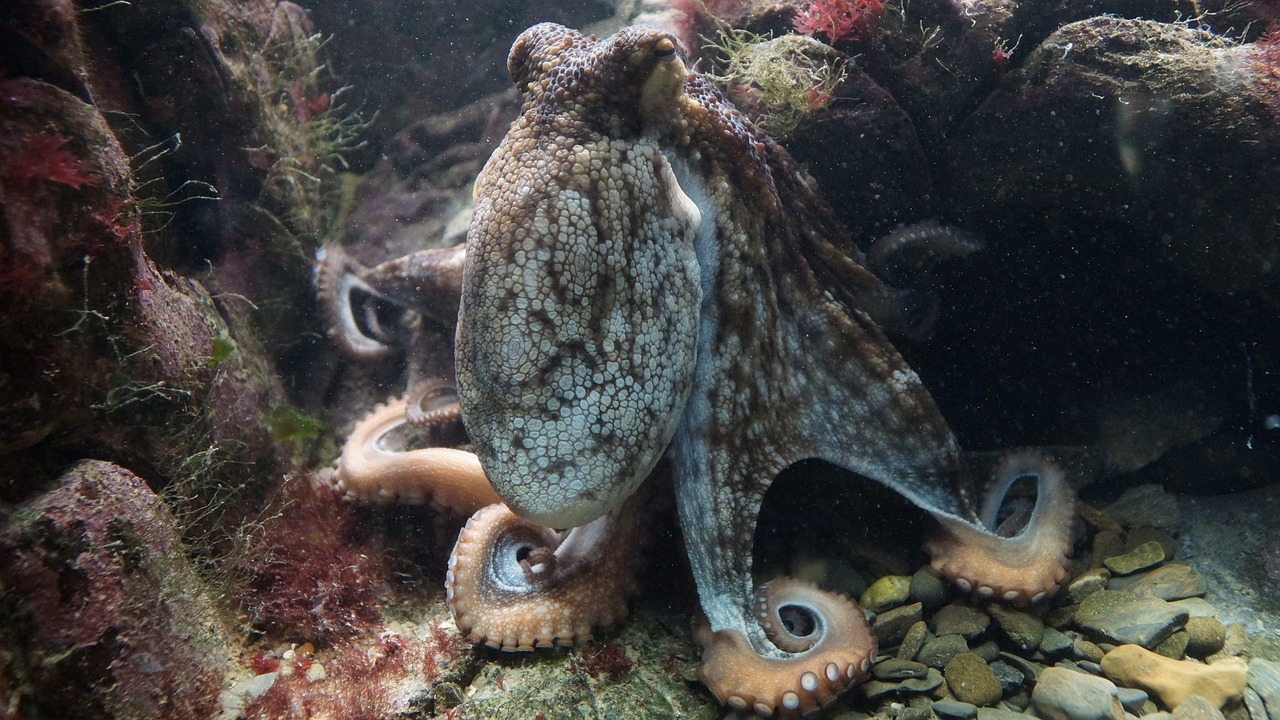Octopuses are fascinating creatures that are found in all of the world’s oceans, except for the Arctic and Antarctic. They are intelligent, adaptable, and skilled predators.
Table of Contents
Scientific Name
The scientific name for the octopus is Octopus vulgaris. This name comes from the Greek words “octo”, meaning “eight”, and “pous”, meaning “foot”.Diverse Species and Varieties
Diverse Species and Varieties of Octopus
Octopuses encompass a wide range of species, each showcasing unique adaptations and characteristics. Some notable types of octopuses include:
- Common Octopus (Octopus vulgaris): Widely distributed in oceans, this species is known for its intelligence and problem-solving abilities.
- Giant Pacific Octopus (Enteroctopus dofleini): As one of the largest octopus species, the giant Pacific octopus inhabits the North Pacific Ocean and displays remarkable camouflage skills.
- Blue-Ringed Octopus (Hapalochlaena spp.): These small, venomous octopuses are recognized for their vibrant blue rings and potent toxins.
Evolutionary Journey: Adapting to the Depths
The evolutionary history of octopuses is a tale of successful adaptations. Emerging from their mollusk ancestors, octopuses evolved unique traits such as their exceptional problem-solving skills, highly flexible bodies, and remarkable ability to change color and texture.
Behavioral Marvels: Intelligence in Action
Octopuses are renowned for their intelligence and cognitive abilities. They exhibit problem-solving skills, complex learning behaviors, and the capacity to navigate intricate mazes in laboratory settings. Their exceptional adaptability and rapid learning contribute to their success in diverse marine environments.
Habitat Preferences: Masters of the Deep Sea
Octopuses inhabit a variety of ocean environments, ranging from shallow coastal waters to abyssal depths. Their ability to adjust to different habitats is mirrored in their behavior and physical characteristics, enabling them to thrive in both warm and cold waters.
Dietary Habits: Cunning Predators of the Sea
Octopuses are skilled hunters, preying upon a diverse array of marine creatures. Their diet may include fish, crustaceans, mollusks, and even other cephalopods. Their hunting techniques, such as ambushing and camouflage, enable them to secure prey with precision.
Predators and Survival Tactics
While octopuses have developed ingenious adaptations to evade predators, they are not exempt from threats. Larger marine animals such as sharks, dolphins, and larger fish species may prey on octopuses. In response, octopuses employ tactics like jet propulsion and ink release to escape danger.
Reproduction and Life Cycle
Octopus reproduction is a complex process that culminates in the production of thousands of eggs. Female octopuses invest considerable energy in caring for their eggs, protecting and aerating them until they hatch into planktonic larvae. The life span of an octopus varies significantly by species, with some living just a year or two, while others can survive for several years.
Population Dynamics: A Fascinating Web of Life
Octopus populations are influenced by a myriad of factors, including prey availability, environmental conditions, and predation pressure. These dynamic interactions contribute to the intricate balance of marine ecosystems.
Conclusion
The world of octopuses is a realm of intrigue and complexity, showcasing the marvels of evolution and adaptation. With their intelligence, camouflage skills, and fascinating behaviors, octopuses continue to unveil the secrets of the ocean depths. By exploring their captivating attributes, we gain a deeper appreciation for the diversity and splendor of marine life that surrounds us.
FAQs
1- Can octopuses change their color and texture instantly?
Yes, they can rapidly change both their color and texture, allowing them to blend seamlessly into their surroundings and communicate visually.
2- Are octopuses social creatures?
Octopuses are generally solitary animals, but they may display limited social interactions during mating or territorial disputes.
3- Do octopuses have a strong sense of smell?
While octopuses do possess chemoreceptors that allow them to detect chemicals in the water, their sense of touch and vision are more prominent in their hunting and navigation.
4- Can octopuses communicate with each other?
Octopuses communicate through visual displays, body postures, and color changes. These interactions convey information to conspecifics and other marine creatures.
5- Are octopuses venomous?
Yes, some octopus species, such as the blue-ringed octopus, are venomous. Their venom contains powerful toxins that they use for defense and hunting.
